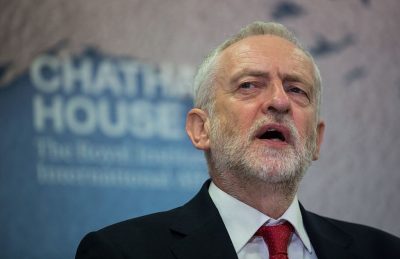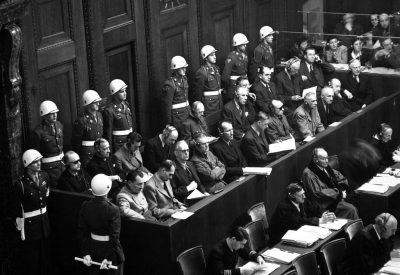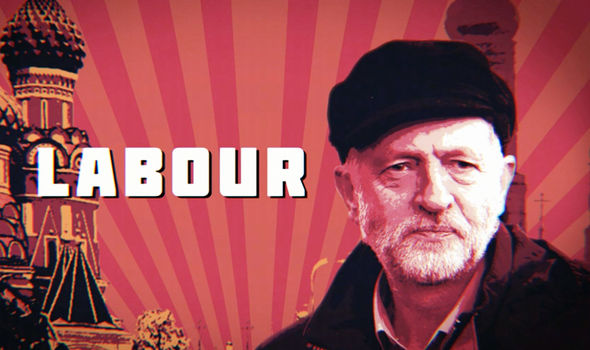Panic drives the smear attack against Labour Party leader Jeremy Corbyn whose background as a radical socialist, not his criticism of Israel and support for the Palestine, threatens the British establishment’s hold on power, argues Alexander Mercouris.
By Alexander Mercouris
in LondonSpecial to Consortium News
Anti-Semitism did once have a place in British society. By way of example, readers of Agatha Christie stories written before World War II will come across stock anti-Semitic representations of Jewish characters. As recently as the 1970s, I can remember what would today be considered Semitic stereotypes being commonly used to represent Jewish people in many of the unfunny comedy shows broadcast by British television in that period, including some the BBC broadcast.
Racist stereotyping of this sort was commonplace in Britain right up to the 1970s, and was certainly not exclusive to Jews, as Irish people, black people and people from the Indian subcontinent well recall. Some still persists today, but by and large racial stereotyping is socially unacceptable, except (worryingly) with
respect to Russians.
By comparison with other European countries, anti-Semitism in Britain has, however, not been a major phenomenon in modern British society and recent British history. There has been no official persecution of Jews in Britain since they were allowed to resettle in England by Oliver Cromwell in the 1650s, while the attempt by Oswald Moseley’s British Union of Fascists to stir up political anti-Semitism in the 1930s provoked fierce resistance.
Jewish people now play a full and active role in British life, and this happens without notice or comment.
As for the formal institutions of Britain’s Jewish community, these form an integral part of British life. The chief rabbi has enjoyed a measure of recognition as the nominal leader of the British Jewish community from the British state ever since the 1870s. Since the 1980s, by convention, the chief rabbi has been admitted to the British Parliament as a peer of the House of Lords, though the present chief rabbi, Ephraim Mirvis, has not yet been so admitted. The British Jewish community’s major institution—the Board of Deputies of British Jews—has had a continuous existence since the 1760s.
Though there are anti-Semites in Britain as there are everywhere else, they are very much a minor and ugly fringe, and moreover a generally despised and disliked one, with no influence or traction in British politics or in British life.
Despite lurid claims to the contrary, actual cases of anti-Semitic violence and property damage in Britain are
relatively few, and certainly appear to be less than other types of racial violence.
Indeed, Jewish people today are so much an integral part of British society and of British life that I for one question whether it is even accurate to speak of a distinct “Jewish establishment” among British Jews. Rather, it seems to me that it would be more accurate to say that there are some prominent British Jews and some prominent British Jewish institutions—such as the chief rabbi and the Board of Deputies of British Jews—which today form an integral part of the larger British establishment, whose general perspectives and interests they share.
Which brings me to the present “anti-Semitism” campaign against Jeremy Corbyn.
The Left-Wing, Anti-Imperialist Labour Tradition
The British Labour Party was formed in 1900 before World War I, and if there has been one political movement in Britain that has stood rock solid against all manifestations of anti-Semitism in British life (perhaps more than any other group), it is the British Labour Party, and first and foremost its left wing.
This is consistent with the traditional stance of the left wing of the British Labour Party, which can be broadly defined as anti-racist, anti-fascist, and, above all, anti-imperialist. The latter has been important in a country like Britain—historically the preeminent imperialist power—where imperialism was justified in racist terms. British left-wing anti-imperialists, who are mostly drawn from the working class (a fact which gave British anti-imperialism a strong class-conflict character) strongly were predisposed to be anti-racist.
Not surprisingly, British Labour left-wing anti-racism extended to staunch opposition to anti-Semitism, which is, of course, the reason why so many British Jews were drawn to the Labour Party in the first place.
The key point to understand about Corbyn is that it is from within this left-wing, anti-imperialist Labour tradition that he comes. His parents after all first met each other in the 1930s attending a rally in support of the Spanish Republic at the time of the Spanish Civil War. He has been loyal to the traditions of the Labour Party’s anti-imperialist left ever since he began his career in politics, as his long record of opposition to all the West’s interventionist wars shows. Needless to say, that includes strong and consistent anti-racism and the opposition to anti-Semitism which goes with it. Strikingly, Corbyn’s acceptance speech following his election as Labour leader included a
declaration of support for refugees.
To insinuate that Corbyn is an anti-Semite—as is increasingly happening—and to insinuate that the left wing of the Labour Party to which he belongs is riddled with anti-Semitism and poses an “
existential threat to British Jews” (as several of the British Jewish community’s newspapers have alleged) is more than just absurd. It stands reality on its head. Corbyn is not an anti-Semite. Anti-Semitism, on the contrary, is what he always has defined himself against, and to claim otherwise is dishonest and even surreal.
Corbyn’s well-known support for the Palestinian people’s struggle does not contradict his opposition to anti-Semitism. Rather, it is the product of his consistent anti-imperialism, making Corbyn’s support for the Palestinians and his opposition to anti-Semitism consistent.
All this is well understood by those who are conducting the anti-Semitism campaign against Corbyn within the Labour Party and outside it. Corbyn has been a fixture of British political life ever since he was first elected a member of Parliament in 1983. The British establishment—including those members of the British establishment who are Jewish—know him well, and they know well what his actual beliefs are. It is not credible that they believe him to be an anti-Semite, or that they think that the left wing of the British Labour Party, which supports him, is riddled with anti-Semitism.
The Push to Stop Corbyn
The essential mendacity of the whole anti-Semitism campaign and the true motives behind it is shown by the exceptionally narrow frame of reference in which it is being conducted. It is universally acknowledged that the allegations of anti-Semitism being made against Corbyn and some of his supporters stem from Corbyn’s longstanding support for the Palestinian people’s struggle and his equally longstanding criticisms of Israel’s response to that struggle. As’ad AbuKhalil has discussed this aspect of the affair for Consortium News with
great thoroughness and detail.
It is worth pointing out, however, that the criticisms being made against Corbyn barely touch on the Palestinian question at all. Anyone looking at these criticisms for a discussion of the Palestinian issue, even one from a position sympathetic to Israel and hostile to the Palestinians, will fail to find it.
The Palestinian struggle, the plight of the Palestinian people, the whole history of the Arab-Israeli conflict and the current policies both of Israel and of the Western governments which support it, are barely mentioned. When Palestinians do get mentioned at all, it is purely as terrorists. The entire campaign is being conducted as if Corbyn and those who support him hate Zionism and Israel and therefore allJews.
It is, of course, impossible that those who are conducting the campaign against Corbyn are any more ignorant of the basic facts of the Palestinian struggle and of the Arab-Israeli conflict than they are ignorant of Corbyn’s actual beliefs. If they are not mentioning these facts, it is not because they are ignorant of them. It is because they choose not to mention them.
Corbyn’s background as a radical socialist makes him a threat to the British establishment’s power. (Chatham House / Wikimedia)
In other words, the campaign against Corbyn has very little to do with the situation in the Middle East. I say this, though I have no doubt that the Israeli embassy is playing an
active role in the campaign, a fact which is apparently freely admitted within Israel itself, though not in Britain.
However, it is a mistake to see the campaign against Corbyn as principally Israeli inspired. If it were, I would expect those conducting it to say far more about the situation in the Middle East than they do. Nor, in my opinion, is the campaign exclusively or even primarily the work of British Jews. As it happens, the Jewish community in Britain is far from united behind the campaign, with many British Jews expressing doubts or even outright opposition to it.
Instead, the campaign should be seen for what it is: the latest in a long series of attacks by the British establishment against Corbyn, the one British politician who more than any other embodies the threat to the current status quo and to the British establishment’s hold on power.
These attacks have at various times sought to portray Corbyn as a Communist, a Russian agent, a terrorist sympathizer and a traitor. Adding a charge of anti-Semitism to this catalogue is an obvious further step, and given Corbyn’s well-known advocacy of Palestinian rights an easy one. The only surprise is that it has not happened before.
That the anti-Semitism campaign is the latest in a long series of establishment attacks on Corbyn, which extend all the way back to his election as Labour’s leader, is shown by the sheer breadth of the campaign. The parliamentary Labour Party, the entire Conservative Party and the media (including the BBC and the supposedly left-wing Guardian newspaper) have all embraced it. Certainly, it extends far beyond those members of Britain’s Jewish community who form part of the greater British establishment and who initially spearheaded it. As it happens, the great majority of British politicians and commentators who have joined in the campaign are non-Jews.
A New Political Dynamic
As for the campaign’s greater vehemence by comparison with earlier campaigns, that is the product of the changed political dynamic in Britain since the June 2017 general election.
Before that election, the British establishment did not take Corbyn seriously, since it assumed that the British electorate would reject him in any election which he fought. The horrifying realization following the June 2017 election that the opposite is the case has—not surprisingly—caused panic and has led to the establishment pulling out all the stops. That explains not just the greater vehemence of this campaign but why it has persisted for so long.
In other words, what is driving the campaign is not some overarching loyalty on the part of British Jews to Israel or a belief that Corbyn is an anti-Semite. Rather, it is British establishment panic. As Britain’s Conservative government disintegrates, Corbyn stands poised to become Britain’s next prime minister. That terrifying prospect—of a radical socialist in 10, Downing Street—is one which must be averted at all costs. That is the reason for the anti-Semitism campaign we have been witnessing, and thus all the other campaigns against Corbyn we have witnessed, of which there are certainly more to come.
While the causes of the anti-Semitism campaign are mainly domestic, there is a wide consensus among Corbyn’s supporters that he has not handled his response to the campaign well. The general opinion—that he has been far too accommodating to his critics—has been forcefully argued in Consortium News by
Jonathan Cook.
Corbyn himself has conceded too much ground on anti-semitism. As a lifelong anti-racism campaigner, the accusations of anti-semitism have clearly pained him. He has tried to placate rather than defy the smearers. He has tried to maintain unity with people who have no interest in finding common ground with him.
And as he has lost all sense of how to respond in good faith to allegations made in bad faith, he has begun committing the cardinal sin of sounding and looking evasive – just as those who deployed the anti-semitism charge hoped. It was his honesty, plain-speaking and compassion that won him the leadership and the love of ordinary members. Unless he can regain the political and spiritual confidence that underpinned those qualities, he risks haemorrhaging support.
This widespread view that Corbyn has been accommodating to people who seek only his destruction has even produced some curious examples of
drafts of “speeches” written for him by some of his sympathizers setting out the sort of things which they think he should say.
While I have considerable sympathy for this view, I think it is only fair to add that Corbyn happens to be one of the most polite and diffident personalities in British politics. The contrast with, say, Donald Trump in the United States, could not be greater. It is not in Corbyn’s nature to respond to his critics with the same forcefulness that they extend to him. While this makes Corbyn an indifferent orator and blunts his impact in debates in the House of Commons, his politeness and diffidence is an integral part of his appeal. To call on him to act differently is to call for a different man, with no guarantee that that man would command anything remotely approaching the level of support that Corbyn has.
Is the Campaign Working?
It is important to stress this point because as of the time of writing it is far from clear to me that—contrary to what Jonathan Cook fears—this latest campaign against Corbyn is succeeding.
The poll numbers barely have shifted, with Conservative and Labour both polling around 40 percent of the vote since the June 2017 general election, and most opinion polls put Labour ahead. Though the anti-Semitism campaign may have lost Labour some Jewish votes in places like the London district of Barnet, the generality of the British voters seem indifferent and unimpressed by the whole affair.
I suspect that the truth is that Corbyn has been around in British politics for so long that the British electorate long ago formed its view of him. Knowing Corbyn as well as they do—as well as the left-wing tradition from which he comes—the vast majority of British center-left voters who make up Corbyn’s electoral base find the whole idea that he is an anti-Semite just too fantastic to take seriously. Besides the fact that the anti-Semitism campaign is merely the latest in a series of campaigns against Corbyn launched from the moment he became Labour’s leader makes the true motives of his critics in the end altogether too obvious.
The Nuremberg trials, circa 1945-46. (National Archives)
Cook has
expressed the fear that if the Labour Party adopts the four additional working examples of anti-Semitism drafted by the International Holocaust Remembrance Alliance (IHRA)—which it has hitherto resisted doing because of the way they limit criticism of Israel—that will make future criticism of Israel by Corbyn and by other members of the Labour Party all but impossible, and will open the way to a purge of Palestinian sympathizers within the Labour Party. [Editor’s note: The Labour Party
altered its anti-Semitism definition on Sept. 4 at its National Executive Committee meeting and adopted the four additional
working examples of anti-Semitism drafted by the IHRA.]
Similar concerns have been expressed by Norman Finkelstein, who sees the whole attempt to impose any sort of definition of anti-Semitism on the Labour Party as an
attack on the party’s traditions and on free speech.
These concerns are far from groundless. On the contrary, there is no doubt that silencing criticism of Israel is very much a part of the agenda of some of the people behind the campaign, with the British establishment (not just its Jewish part) united in support of Israel in the same way as are the political establishments of all the other Western countries. Consider, for example, this extraordinary article by
Andrew Feldmanin
The Evening Standard, a newspaper edited by former Conservative Prime Minister David Cameron’s friend and former Chancellor George Osborne, which contains this passage:
Anti-Semitism and anti-Zionism are the same thing. They are two sides of the same coin. Anti-Zionism is the belief that the state of Israel should not exist. That it should be dismantled. This is not the same as saying, quite legitimately, that you disagree with the policies of the current or any other Israeli government; or calling for the reversal of the settlement programme in the West Bank; or demanding a return to earlier borders and the creation of a two-state solution.
Some historical context is important here. Two thousand years ago, at the end of a long and bloody revolt, the Temple was destroyed and the Jewish people were dispersed far and wide, across the Roman Empire and beyond. They settled in many places. Some made them welcome for a time. Others less so. Jewish people lived in a constant state of trepidation. Periods of peace and prosperity punctuated by pogroms, inquisition and expulsion.
In Europe, the Holocaust was the crescendo of centuries of rumbling antipathy. Jews sought to escape the horror but the numbers who found refuge were pathetically small. Even the UK only accepted 70,000 Jewish refugees before the Second World War and 10,000 during it.
Quite simply, there was nowhere for them to go, so six million people perished out of a total global Jewish population of 17 million.
Finally, after this destruction, the world decided that enough was enough. The Jewish people needed their own place to go when things went wrong. And the ancient homeland was chosen. It was to be shared with the Palestinians on lines established by a United Nations resolution in 1948.
This was not the only work for the cartographers after the Second World War. The demise of empire, the calls for national determination and the need for pragmatic solutions brought about the creation of new states in Europe, Africa, the Indian subcontinent and elsewhere in the Middle East. Lines were drawn on maps. Sometimes they respected geographical, religious and tribal boundaries; sometimes they did not. Everyone was doing the best they could to make sense of the cataclysmic events of the previous decades.
The State of Israel served its purpose. A national homeland for the Jewish people existing alongside the Jewish communities that continued to live around the world. And when things did not go well for some of those communities — in Russia, Iraq, Morocco and elsewhere — it was a place of sanctuary. It accepted refugees in huge numbers without question.
Note that the Palestinians are barely mentioned in the whole article, which claims that anti-Zionism is anti-Semitism and does so by linking anti-Zionism to the whole history of anti-Semitism in the West, culminating in the Nazis and the Holocaust.
Needless to say, though Feldman appears to admit that it is legitimate to criticize Israel, he makes no criticisms of Israel anywhere in his article. In practice, on the basis of his article, it is difficult to imagine what criticism of Israeli policy toward the Palestinians Feldman would not define as anti-Semitic.
Having said this, it is important to retain perspective. Even though the Labour Party changed its anti-Semitism definition, that will not end criticism of Israel within the Labour Party or in British society. Corbyn himself will not change his views, nor will other supporters of the Palestinian struggle within the Labour Party or in British society.
Ultimately, what is causing the growing criticism of Israel in Britain as elsewhere are
Israeli policies, and attempts to silence criticism of those policies by conjuring up the specter of anti-Semitism or by resorting to purges and inquisitions that can only, in the end, threaten to provoke a backlash.
How the Anti-Corbyn Campaign Is Like Russia-gate
The anti-Semitism campaign against Corbyn in Britain bears more than a passing resemblance to the Russia-gate scandal in the United States.
Controversial BBC graphic seeking to link Corbyn to Russia. (BBC)
In both countries, the establishment has been shocked by popular insurgencies on the right and left and the rise of a seeming outsider: Corbyn in Britain, and Trump (with far less cause) in the U.S. In both countries, this has provoked a shrill establishment campaign against the outsider. In both countries, the allegations which form the basis of the campaign—of anti-Semitism in the case of Corbyn, of being an agent of the Russians in the case of Trump—are to anyone with even a basic grasp of reality utterly fantastic. In neither country does the sheer absurdity of the allegations seem to matter for those who have invested in the campaign. Instead, the political class in both countries pretends to believe them, while the media has embraced them. A media effort has been made to link Corbyn to Russia too.
In both countries, interested outside powers are involved in the campaigns— Israel in the case of the anti-Semitism campaign against Corbyn in Britain, Britain and some other U.S. European allies in the Russia-gate scandal against Trump in the U.S. But the origins of both campaigns are domestic.
In both Britain and the U.S., the core electoral base of both Corbyn and Trump remains unmoved by the hysteria and the swirl of allegations, but in the meantime, real damage to the political system is being done. Both countries are unable to formulate rational foreign policies, whether with respect to the situation in the Middle East in the case of Britain, or with respect to relations with Russia in the case of the U.S.
Corbyn and the movement he leads have far deeper roots within British society than Trump does in the U.S. There has been a
continuous tradition of political radicalism in Britain going back to the period of the French Revolution. Corbyn stands squarely within that tradition, a fact which is perhaps better understood in Britain than it is outside it. That tradition for the moment is rising in the case of
younger Britains.
That, of course, is why, against all expectations, Corbyn, was elected leader of the Labour Party, and why, again contrary to all expectations, he increased the Labour’s share of the vote so dramatically in the June 2017 general election.
That is reason for the intensity of the campaign against him, but it also explains why he has been able to withstand it up to now. The shape of British politics in the future will be determined by whether or not he is able to continue to do so.
Alexander Mercouris is a political commentator and editor of The Duran
River to Sea Uprooted Palestinian
Uprooted Palestinian 
 <img class=”alignleft wp-image-27578″ src=”https://consortiumnews.com/wp-content/uploads/2018/05/alexander_mercouris-864x400_c-1-150×150.jpg” alt=”” width=”90″ height=”90″ />Any discussion of the current “anti-Semitism crisis” in the British Labour Party needs to start with an understanding that there is no “anti-semitism crisis” in the British Labour Party, or in Britain.
<img class=”alignleft wp-image-27578″ src=”https://consortiumnews.com/wp-content/uploads/2018/05/alexander_mercouris-864x400_c-1-150×150.jpg” alt=”” width=”90″ height=”90″ />Any discussion of the current “anti-Semitism crisis” in the British Labour Party needs to start with an understanding that there is no “anti-semitism crisis” in the British Labour Party, or in Britain.

 Uprooted Palestinian
Uprooted Palestinian 












No comments:
Post a Comment